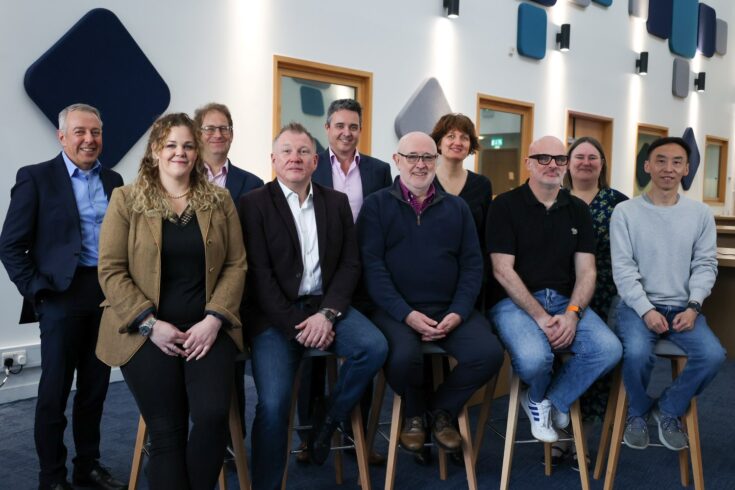Science and Technology Facilities Council
|
|
Digital and quantum start-ups join pioneering business support programmes
The Digital and Quantum Business Incubation Centres are helping start-ups to bridge the gap between science and business.

Paul Vernon (back centre) and colleagues from STFC and the Hartree Centre welcoming MagnifyB and Voxshell (front row) to the Digital BIC. Credit: STFC
The Science and Technology Facilities Council (STFC) has announced the first innovative start-ups to join two new business support programmes aimed at helping digital and quantum technology start-ups succeed in global markets.
Seven pioneering UK start-ups have been selected to join the Digital Incubation Centre (Digital BIC) and the Quantum Business Incubation Centre (QuBIC), designed to help early-stage technology businesses reach their full potential.
From optimising patient operation lists to new video game technologies, these pioneering businesses are developing potentially revolutionary products and services to bring economic and societal benefits to the UK.
Digital BIC
In collaboration with the STFC Hartree Centre, the Digital BIC is providing early-stage companies with an opportunity to use advanced digital technologies in their mission to turn their technology concepts into market reality.
From artificial intelligence (AI) to data analytics, four new companies will join the Digital BIC to develop transformative solutions across a range of industries.
The first companies to join the Digital BIC are:
MagnifyB
Developing an affordable software-as-a-service based, AI-powered, virtual adviser for small and medium-sized enterprises (SMEs), covering more than 1,000 business areas.
MagnifyB is a business performance management and assessment toolset. It uses logic and AI to provide powerful management information, business intelligence and an e-learning platform that offers tailored advice and support, empowering SMEs to improve business productivity and profitability.
Pixel Research
Developing advanced techniques for the upscaling and style transfer of low-resolution assets into premium high-resolution assets in the video games market.
It is the first business of its kind to focus on hand-drawn assets to remaster vintage video games for modern resolutions and hardware.
Spotlight Pathology
Developing AI tools to streamline the diagnosis of blood cancers, with an initial focus on lymphomas.
The solution increases the diagnostic capacity of pathology services with the existing workforce, improves the objectivity of diagnosis to minimise uncertainty in the process and reduces turn-around times for patients to receive their diagnosis.
Spotlight Pathology is a spin-out from The University of Manchester and has received support from:
- Innovate UK
- National Institute of Health Research
- UK Research and Innovation (UKRI)
- Deepbridge Capital
Voxshell
Reducing the generation of 3D mesh digital models from an eight-hour process to just five minutes by creating a new meshing algorithm for high performance computing (HPC). This is normally a slow process that can take up to 80% of an engineer’s time.
Empowering innovation
Located at STFC’s Daresbury Laboratory, at Sci-Tech Daresbury in the Liverpool City Region, the Hartree Centre is home to some of the UK’s most advanced supercomputing experts and technologies. It is also the UK’s only supercomputing centre dedicated to industry engagement.
Kate Royse, Director, Hartree Centre, yesterday said:
I am very much looking forward to working with these four new businesses, as they harness the advanced digital skills and technologies here at the Hartree Centre to overcome industry challenges and grow into globally successful enterprises.
The Digital BIC exemplifies the Hartree Centre’s firm commitment to supporting high-potential digital tech start-ups across the North West and beyond, helping to bridge the gap between transformative ideas and commercial success.
QuBIC
In partnership with the UKRI National Quantum Computing Centre (NQCC), the QuBIC is supporting businesses developing innovative products or services that are reliant on quantum technologies.
From quantum hardware to software and applications, the three new quantum computing businesses to join the QuBIC are spearheading new quantum technologies to solve challenges across a wide range of sectors.
The first companies to join the QuBIC are:
Applied Quantum Computing
Developing ways to make healthcare smarter using a mix of classical and quantum computing to develop solutions to complex problems, such as optimising patient allocation to theatre operating lists.
The result would be improved healthcare for patients, a more satisfied workforce and financial benefits for the NHS.
Finchetto
Developing a ground-breaking optical network switch enables faster, more sustainable computation.
This world-first technology is set to boost performance across various sectors, such as:
- data centres
- HPC
- AI
- telecommunications networks
These are crucial for handling present and future quantum computing workloads efficiently.
OpenQuantum
Revolutionising quantum computing by providing a cutting-edge platform, open-source tools and world-class components and building systems that deliver significant advantages now and in the future.
This innovative approach not only simplifies the construction of quantum computers but also democratises access to quantum computing for a global community of scientists, software engineers, and developers. This will also enable the acceleration of the timeline to widespread adoption and leveraging quantum in many critical applications.
Driving the UK quantum computing mission
Located at the Harwell Campus in Oxfordshire, the NQCC is the UK’s national lab for quantum computing, dedicated to delivering quantum computing capabilities for the UK.
Working in collaboration with the Engineering and Physical Sciences Research Council, it sits within the UK National Quantum Technologies Programme, aiming to build capabilities in quantum technologies and help bring these to market.
Dr Simon Plant, Deputy Director for Innovation at the NQCC, yesterday said:
We are pleased to be a partner in the QuBIC program reaffirming our commitment to support the growth of the UK’s quantum computing industry. We aim to help early-stage technology companies achieve their full commercial potential by de-risking the route from proof-of-concept to market for innovative new products and ideas.
Tangible business benefits
The launch of the two new BICs builds upon STFC’s long-standing experience of managing support programmes and facilities for small businesses across its locations nationally.
This includes the successful European Space Agency BIC UK, through which STFC has supported more than 130 start-ups over the last decade, with a 95% survival rate over five years.
The cutting edge of innovation
Paul Vernon, Executive Director of Business and Innovation at STFC, yesterday said:
STFC’s Digital and Quantum business incubation centres aim to provide start-ups with a critical opportunity to turn their innovative ideas into market reality. I warmly welcome these seven pioneering new businesses to the programme.
The UK is home to an exciting and growing community of high-tech businesses operating at the cutting edge of innovation, constantly finding better ways to benefit our economy and society.
With a solid and successful track record in supporting start-ups, STFC is deeply committed to creating a dynamic environment where such businesses can minimise the risks associated with going from concept to market and achieve their full commercial potential.
In alignment with the government’s mission to establish the UK as a technology superpower by 2030, this represents an exciting opportunity to drive growth and prosperity that will benefit the UK.
Outstanding support for technology start-ups
The new Digital BIC and QuBIC programmes each provide an outstanding support package for technology start-ups.
Successful applicants receive:
- up to £50,000 targeted research and development (R&D) funding
- up to £10,000 R&D vouchers to spend with public sector partners
- up to 50 hours of business support (including one-to-one coaching, investment readiness, market validation and intellectual property advice)
- networking and introductions to investors, funders and stakeholders
- engagement with campus and cluster ecosystems
Get involved
Find further information about application and eligibility for the Digital BIC and QuBIC.
Original article link: https://www.ukri.org/news/digital-and-quantum-start-ups-join-pioneering-business-support-programmes/


